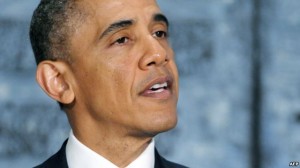
�The United States said on Monday it would be more open to Iran taking part in a long-delayed peace conference on Syria if Iran publicly backed a 2012 statement calling for a transitional government in Syria.
The United States accuses Iran of supporting the government of Syrian President Bashar Assad in a civil war that has run for more than two years, killed more than 100,000 people and eluded all efforts at a peaceful settlement.
The June 30, 2012, "Geneva Communique" sought to chart a path to a diplomatic resolution of the conflict. It was agreed by major powers such as the United States and Russia, Gulf states and Syria's neighbors Iraq and Turkey - but not Iran, which was not invited to those talks.
Russia and the United States agreed in May to try to hold a "Geneva II" conference to implement the agreement, which called for a transitional governing authority to rule Syria but left open the question of whether or not Assad must leave power.
The agreement said such a transitional government must be chosen by the Damascus government and the opposition by mutual consent, which the United States says effectively rules out Assad staying in power.
Efforts to convene the conference have been delayed - US Secretary of State John Kerry originally said it might be held by the end of May - and the recent diplomatic focus has been on ridding Syria of its chemical weapons following an Aug. 21 attack in which more than 1,000 people are thought to have died.
On Monday, State Department spokeswoman Marie Harf suggested that the United States might be better disposed to Iran's taking part in a Geneva II conference if Tehran were to embrace the original Geneva Communique.
"We've been clear, multiple times, about Iran's destructive role in the Syrian crisis and our expectation that any party that (is) included in Geneva II must accept and publicly support the Geneva communique," she said.
"If, and this is an if, Iran were to endorse and embrace the Geneva communiqu� publicly, we would view the possibility of their participation more openly," Harf said, later adding the United States would then view its taking part more "favorably."
The United States and Iran have recently started something of a diplomatic rapprochement, with President Barack Obama speaking by telephone with Iranian President Hassan Rouhani on Sept. 27, the highest level contact since 1979.
The two sides, along with Britain, China, France, Germany and Russia, are sending delegations to Geneva for separate talks on Oct. 15-16 to try to address a dispute over Iran's nuclear program.
The United States and its allies suspect Iran is using its civilian nuclear program as a cover to develop atomic weapons. Iran denies this, saying its program is for peaceful purposes.
By Reuters
The Iran Project is not responsible for the content of quoted articles.










